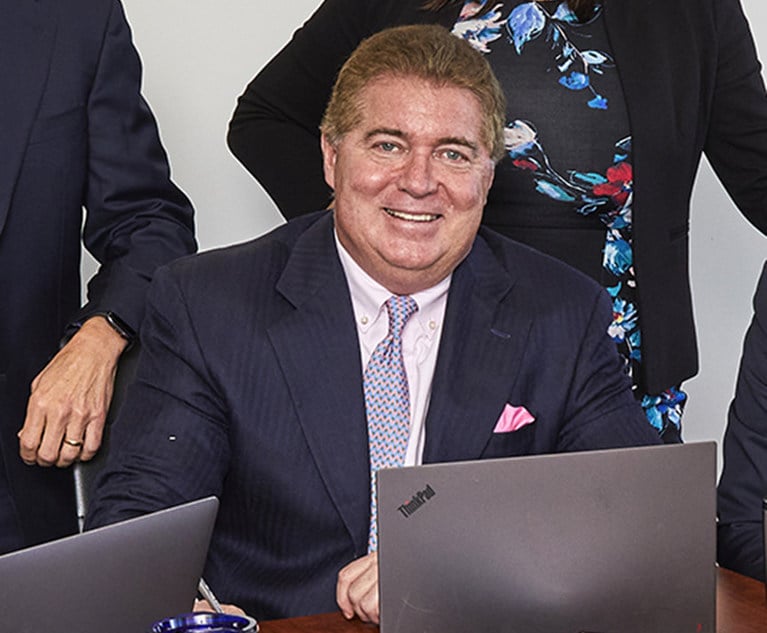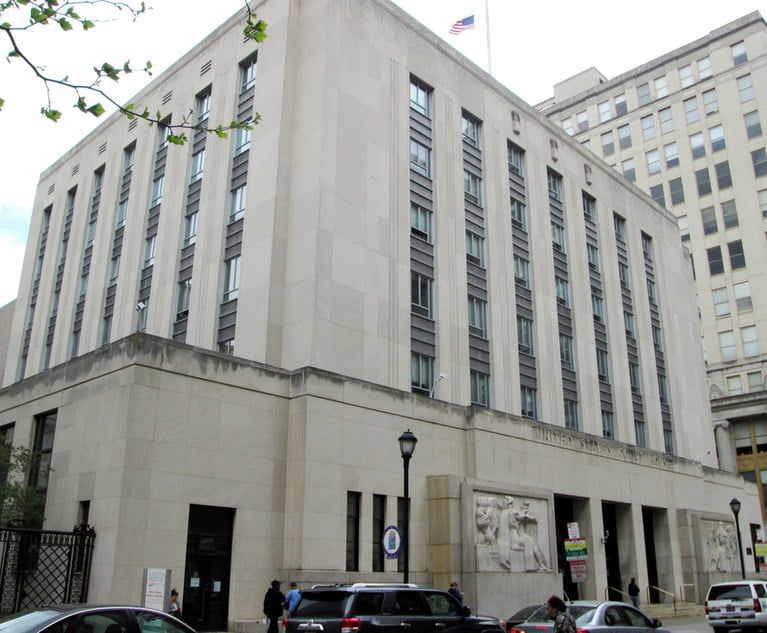Slade McLaughlin, a noted mainstay in the Philadelphia trial bar, who headed high-profile sex abuse litigations against the Catholic Church and Penn State, has died.
The McLaughlin & Lauricella name partner passed away April 2. According to his firm partner Paul Lauricella, McLaughlin died of a self-inflicted gunshot wound. He is survived by his wife and three children.
“Everybody knows Slade was a force of nature. He hustled, he steamrolled opponents. … He solved problems. He didn’t create them. He fixed things. He didn’t break them,” Lauricella said. “Slade was the most righteous guy I knew. He’s the guy you want in the foxhole with you. He was always there to give, and always helped other lawyers.”
Lauricella, who knew McLaughlin for 43 years after the two went to law school together, said he is still in shock and processing McLaughlin’s death. According to Lauricella, McLaughlin had appeared stressed in the days before his death, and had seemed worried about, among other things, the amount of work the firm faced now that trials have begun flooding back to Pennsylvania in the wake of the COVID-19 litigation slowdowns.
“I’d have to sit with him and tell him, ‘What are you worried about? Last year we had our best year ever, and this year we’re on track to have another great year,’” Lauricella said. “I’m still racking my head looking for answers.”
Although Lauricella said there likely aren’t rational answers for things like suicide, anxiety and depression, he suggested that McLaughlin’s nature of being such a problem-solver and always shouldering the burdens of others may have also made it harder for McLaughlin to seek out help when needed.
“Life is unpredictable. This business teaches you that terrible things happen to good people for no reason,” Lauricella said. “I think this is also a lesson to a lot of us, who may take this work more seriously than it needs to be taken, that we need to sometimes decompress and take a break.”
McLaughlin’s practice focused on complex and catastrophic injury cases, such as medical malpractice and wrongful death. McLaughlin also represented numerous plaintiffs who sued the Archdiocese of Philadelphia over alleged sex abuse by priests, and represented victims of convicted serial child molester Jerry Sandusky as they brought litigation against Penn State, where Sandusky had been a football coach.
Outside of court, McLaughlin was also a member of numerous personal injury bar groups, and was very active on the listservs for the Pennsylvania Trial Lawyers Association and the Pennsylvania Association for Justice.
Personal injury lawyer Jon Ostroff of Ostroff Injury Law said he had been in regular contact with McLaughlin, doing frequent Zoom get-togethers during the pandemic. Ostroff said McLaughlin also kept in close contact while Ostroff was in Poland recently working with Ukrainian refugees, and, along with giving donations, McLaughlin was active in connecting Ostroff with immigration lawyers.
“He loved his wife and his kids, and was so proud of his family. There was only one thing ahead of the law for him and it was them,” Ostroff said. “He had the heart of a lion and I will miss him.”
Ostroff also said McLaughlin was a tireless lawyer, a resource for those in the community, and “would do anything for his friends and his clients.”
“As much as he gave, he didn’t get. He didn’t take enough time to smell the roses,” Ostroff said. “He did so much for so many people and he rarely just stopped to celebrate all that he accomplished.”
Before launching McLaughlin & Lauricella in 2011, McLaughlin spent 17 years at The Beasley Firm, which served as a training ground for many of Philadelphia’s top personal injury lawyers. During his time at the firm, McLaughlin became one of the firm’s heaviest hitters and consistent verdict winners.
Attorney Stress
Even before the pandemic, attorneys suffered from high rates of depression, anxiety and substance abuse, and the stress of the past few years only seems to have exacerbated that trend. Last year, ALM’s Mental Health and Substance Abuse Survey found that 31.2% of the more than 3,800 respondents felt they were depressed, 64% felt anxiety, 10.1% felt they had an alcohol problem and 2.8% felt they have a drug problem. (This year’s survey, open to anyone working in a law firm, is currently in field and can be filled out at this link.)
Jarrett Green, a wellness consultant and lecturer at USC Gould School of Law, said that even though the pandemic appears to be behind us for now, entirely new stressors can arise. First, Green noted, there is still a lot of uncertainty. Schedules, workloads, commutes, and dozens of other activities making up a person’s daily routine have all changed as we begin to reemerge from the pandemic, and that uncertainty can be a major stressor. More broadly, the ways people interact with courts, clients and each other have also undergone a major change in recent years.
Green also said it can take several months for a person’s brain to adjust and normalize to major life changes. Many people, Green said, may have expected to experience major upswings in their wellbeing once the pandemic subsided, but now may be finding themselves demoralized as the stress lingers and they continue struggling to adjust.
“This coming back into society is a benefit, but it’s also laced with uncertainty,” Green said.
Green said one way attorneys can cope is to reframe their expectations and allow themselves time to mentally and emotionally adjust. Also, Green suggested attorneys take two-minute breaks three times each day to do something like a breathing exercise, an act of forgiveness or kindness, or to do something promoting self-awareness. It’s important, Green said, to interrupt those times of stress to tangibly prioritize your mental health.
“We’re still in a time of great turmoil. Ironically, when things start people back to normal, if people don’t feel as happy or emotionally well, they could be thinking, ‘What’s wrong with me?’” Green said. “Just like it took six months or a year for people to normalize [to the lockdowns], the same thing is about to happen.”
If you or someone you know is struggling with depression or thoughts of suicide, please call the National Suicide Prevention Lifeline at 800-273-8255.
NOT FOR REPRINT
© 2024 ALM Global, LLC, All Rights Reserved. Request academic re-use from www.copyright.com. All other uses, submit a request to [email protected]. For more information visit Asset & Logo Licensing.

 Slade McLaughlin of McLaughlin & Lauricella. Courtesy photo
Slade McLaughlin of McLaughlin & Lauricella. Courtesy photo








